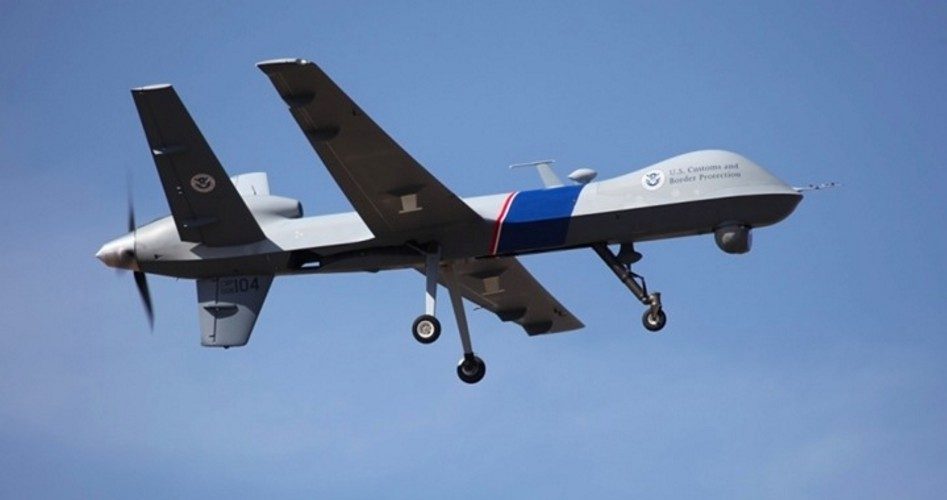
Utah Governor Gary Herbert is lobbying the Obama administration for his state to become one of the six drone testing sites to be established next year by the Federal Aviation Administration (FAA).
In a story published by the Deseret News, the Governor’s Office of Economic Development is identified as playing a lead role in convincing the FAA to choose Utah from among the other sites in 37 states vying for this distinction.
While the exact location of the site is “under wraps,” Herbert’s office is promoting the idea by publicizing the economic benefits to the Beehive State.
The Deseret News reports that “if Utah gets a drone testing site, it could bring more than 1,000 new jobs to the state.” The newspaper gleaned this data from a report published by the Association for Unmanned Vehicle Systems International, a drone industry lobbying organization.
The report cited in the newspaper article also claims that “Utah could see about 245 news jobs, and by 2025 it could be 1,085.”
Representing a consortium of about 7,000 drone manufacturers and operators, the Association for Unmanned Vehicle Systems International issued a code of conduct last year to help assuage fears of potential deprivations of civil liberties in the expanding use of drones.
The press release issued by the Association for Unmanned Vehicle Systems International describes the code as “a set of guidelines to provide AUVSI members — and those who design, test and operate UAS [Unmanned Aircraft Systems] for public and civil use — with recommendations for their safe, non-intrusive operation.”
“We understand as an industry that we’ve got a public relations problem,” Paul McDuffee, a director of the association who helped write the code, told the Associated Press.
A public relations problem is a mild — and perhaps callous — way of describing the problem with the proliferation of drones. As readers are aware, the use of these drones has become a popular political issue among constitutionalists and other friends of liberty.
In what has become one of the most talked-about episodes in recent congressional history, Senator Rand Paul (R-Ky.) stood and filibustered for 13 hours on the floor of the Senate, demanding that the president and Attorney General Eric Holder declare whether they believed they were authorized to use drones to kill Americans on American soil.
The author of the Deseret News article somehow overlooked this aspect of drone use, however, choosing to focus on the less controversial, more financially beneficial, aspects of the aircraft:
The military has long flown drones overseas to support troops, spy on enemies and fire missiles. There’s a recent clamor to fly them domestically to track the health of crops, fight wildfires in remote terrain, conduct search and rescue after a disaster, and perform other chores considered too “dirty, dull or dangerous” for pilots.
Honing in on the purported economic benefit of the state’s participation in the expansion of the surveillance state is a well-practiced art in Utah, from the state capitol to the local media.
Just west of Interstate 15 — the state’s principal north-south corridor — is the National Security Agency’s Utah Data Center.
The $2-billion campus is expected to open in September 2013 and will be equipped with computers capable of monitoring, recording, and cataloging every electronic communication of every American indefinitely.
A story in Wired published last year describes the purpose of the massive compound:
Flowing through its servers and routers and stored in near-bottomless databases will be all forms of communication, including the complete contents of private emails, cell phone calls, and Google searches, as well as all sorts of personal data trails — parking receipts, travel itineraries, bookstore purchases, and other digital “pocket litter.”
How did local media report on this threat to the Fourth Amendment being built in Utah?
“The data center is estimated to be 1 million square feet, sitting on 200-acres, and it couldn’t come at a better time for Utah’s economy,” reported KSL, the Salt Lake City NBC affiliate. The report exulted that “even Congressman Jason Chaffetz is excited. From Washington he told KSL News: ‘It’s a benefit to our economy and our national security.’”
Or, how about this statement posted on the website of the Governor’s Office of Economic Development regarding the state’s focus on attracting “defense and homeland security” industry: “The Utah Defense and Homeland Security Cluster area continues to grow with estimated revenues of over $3.9 billion and nearly 31,000 employees in the industry state-wide.”
And, when it comes to testing drones, the governor says there’s no place like Utah. Again, from the Office of Economic Development’s website:
If you develop or test unmanned systems you need space, infrastructure, talent and a good supply chain. In other words, you need Utah.
Our unique setting in the high desert of the Intermountain West provides hundreds of square miles and 58,000 feet of elevation for testing. As a specific industry cluster our state government is interested in growing, unmanned systems companies can find the incentives, support, workforce development and business-friendly environment they need to thrive. And an existing community of industry leaders such as L-3 Communications, Northrop Grumman, General Atomics and AeroVironment ensure a robust and fully functioning supply chain.
Not even a hint at the legitimate concerns about these products’ potential violations of the Fourth Amendment’s protection against unwarranted searches and seizures. The Fourth Amendment reads:
The right of the people to be secure in their persons, houses, papers, and effects, against unreasonable searches and seizures, shall not be violated, and no warrants shall issue, but upon probable cause, supported by oath or affirmation, and particularly describing the place to be searched, and the persons or things to be seized.
In Utah, it seems, when it comes to hosting the forces of the surveillance state, an outside shot at more jobs and money trumps the very real threat to liberty and the Constitution posed by these ventures.
The Deseret News reports that “the FAA is expected to choose the six drone test sites by year’s end.”
President Obama has authorized these drones to take to the skies, converting the land of the free into the land of the watched. Drone technology developed for the military will soon be deployed in the domestic skies, and citizens will be instantly transformed into suspects. States and cities must now step into the gap and defend citizens from being deprived of their most fundamental rights.
Photo: AP Images
Joe A. Wolverton, II, J.D. is a correspondent for The New American and travels frequently nationwide speaking on topics of nullification, the NDAA, and the surveillance state. He can be reached at [email protected].



